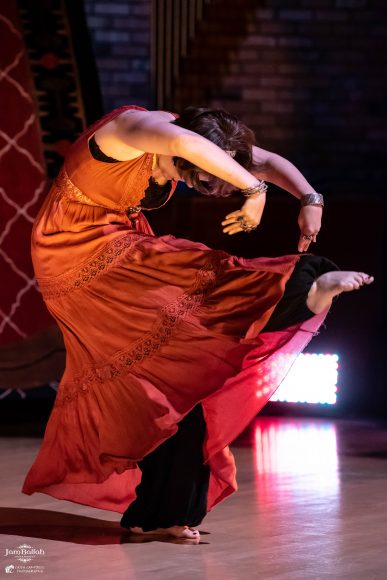
[un]WRAP 2021: “Learning to Say Yes” with Joanna Ashleigh (Courtesy of Casey Campbell/CU Boulder Department of Theater and Dance)
For the past year and a half, dancers across the world have been forced to completely reimagine one of the most important aspects of their art form: live performance. Likewise, the University of Colorado Boulder’s Department of Theatre and Dance has worked to redefine the meaning of live performance, notably for its annual showcase “[un]WRAP.”
Before COVID-19, “[un]WRAP” was an annual week-long symposium for CU Boulder students, which featured international guest performers. In 2020, “[un]WRAP” was shortened to a digital performance streamed on CU Presents for three days, which will continue this year.
2021’s “[un]WRAP,” themed around “Emerging Global Citizenship in Transcultural Dance Fusion,” includes about two hours of curated video submissions from dancers around the world, including Brazil, Algeria, the U.S., Spain, Canada and the U.K. They rehearsed over Zoom for the past 18 months.
“The unexpected, twisted gift of having to do the show remotely is that we were able to open it up to artists around the world,” director Donna Meija said.”Dozens and dozens of countries submitted their entries, which in a way were DIY. The directors and dancers had to become videographers, choreographers and remote performers. With 200 countries involved, [un]WRAP has become a sort of historical textbook that deals with complex social issues.”
From a young age, Meija has been active in the dance community, taking classes from ballet to tap to African dance. Growing up in the westernized world of dance, she has been passionate about exploring diversity in dance, especially when it came down to curating the program of “[un]WRAP.”
“The issue of cultural appropriation has caused so much pain over the ages of colonization of indigenous peoples of different backgrounds,” Meija said. “This performance tries to untangle problematic colonial practices from cultural fusion, which is as old as contact between peoples.”
While working with co-curator Joanna Ashleigh, a CU alum, Meija focused on creativity during the curation process, as well as including diverse dancers of different racial and ethnic backgrounds and gender identities. Though the dance world in general is starting to diversify, Meija takes it to a whole new level.
“The fusion of the dance world was frequently receiving accusations for cultural appropriation,” Meija said. “There are problematic practices in the dance community from racist caricatures and distortions to exclusivity. I knew something had to be done.”
Meija has focused on thoughtfulness throughout the whole curation process, and thus citation became a central part of each dance piece. Each group submitted a brief written artist statement—which has been included in the digital CU Presents program—to explain what the dance means and how it relates to relevant cultural issues. This is intended to rope the audience in and make the dances more relatable, while also showing why each piece is important to the choreographer.
“The overall show is dedicated to the voices of people who are trying to figure out what global citizenship looks like,” Meija said. “I am a multi-heritage person and come from a long line of multi-heritage individuals. There are no clear-cut lines in my lineage. There are more of us that have beautifully diverse backgrounds than we realize. I want to speak for the immigration and multi-heritage experience that is frequently neglected and has not been explored enough.”
“[un]WRAP” will be streamed from Oct. 8-10 on CU Presents here. Tickets are $10 for virtual admission.
Contact CU Independent Staff Writer Haley Lauritzen at haley.lauritzen@colorado.edu.
